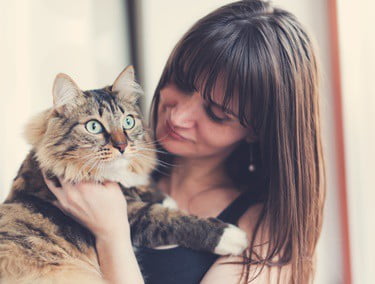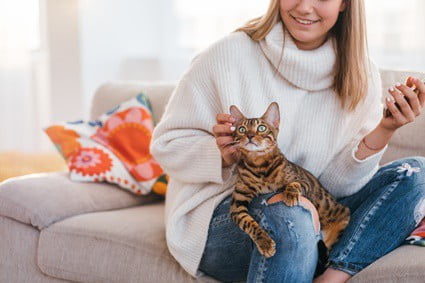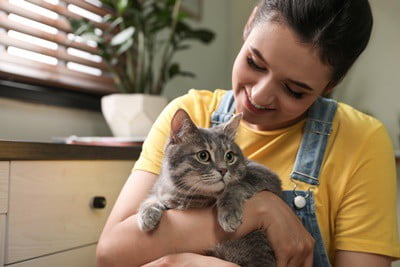Cats have a reputation as being cold and aloof, which is inaccurate. Cats form strong and complex bonds with their owners. Cats often gravitate to one person over anybody else, assigning a so-called favorite human.
Cats want to be understood and have their verbal and body language cues respected. This means avoiding excessive handling, offering food or play upon request, and giving the cat space when it wishes. Cats also remember anything important from their past, so positive memories play a part in choosing a favorite person.
Acting as a cat’s primary caregiver does not necessarily guarantee that you will be its favorite human. This does not mean that a cat dislikes an owner, just that it has imprinted on somebody else.
Why Do Cats Like Some Humans More Than Others?
Displays of affection from cats can sometimes feel arbitrary. Some cats seem largely indifferent to owners that feed and play with them but seem to adore strangers. Other cats will show an innate wariness of all humans, with one or two exceptions.
You are not imagining things. Cats do usually prefer some people to others. There are many explanations for this. Some of them are linked to how the cat is directly treated, others due to circumstances completely beyond your control.
Cats are nervous and afraid of humans by default. Even when domesticated, cats do not default to a position of subservience to their owners. In the mind of a cat, you are just a large, loud and clumsy animal. Ergo, humans are a threat until proven otherwise.
That said, cats are not cold and indifferent toward humans. Particular behaviors and characteristics that make people appealing to cats. Anybody that meets such criteria is likelier to receive feline affection.
Feeding
Survival instincts govern cats, and few things are more important to survival than food. This has earned cats an unfair and inaccurate reputation as animals that show affection to anybody that feeds them.
Cats do remember food sources. This includes any human that has a bag of treats on their person. If you offer such a morsel to a cat, expect to be approached time and again afterward. For a cat to imprint upon a human, more is required.
Cats live for routine. They like to be fed the same meal, at the same time, each day. In theory, this will make a primary owner a cat’s favorite person, although external circumstances can foil this.
Some cats enter other homes, seemingly demonstrating affection for the occupants of these properties. If the cat is being fed in this home, and the human occupants give the cat no reason to fear them, the cat will keep returning.
Handling
Handling is a major trigger point for cats and key to earning a cat’s admiration and adoration. Unlike other pets, it’s a lack of handling that cats look for in their human companions. As per Applied Animal Behavior Science, cats associate handling with the vet.
Cats like to remain in control of their environment. This means that being scooped up and handled without request is a fast way to agitate a feline. Most handling is born of affection or necessity, but cats do not know this. Your pet just knows it is powerless.
Cats will almost always gravitate more to humans that do not subject them to handling. This is why cats seem to inexplicably approach people with feline allergies, rubbing themselves against the unfortunate human.
A cat lover is likely to make a fuss of a feline, stroking and picking them up. Somebody that experiences an adverse reaction to cats will show no interest.
The cat will acknowledge this and show a preference for the apathetic human. This feels like a safe person to approach. Better yet, somebody with an allergy will avoid all contact with cats. This makes them a blank canvas of scent, ideal for marking through rubbing.
Communication
As cats cannot speak, they communicate primarily through body language and sounds. Any human that can understand and respond to these cues, whether meows, purrs, or physicality, will curry favor with a feline.
This means knowing when a cat wants attention and when it wants to be left alone. It means reacting quickly if the cats want to be fed or play. It means offering reassurance if the cat is nervous or anxious.
In addition, as explained by Animal Cognition, cats differentiate between humans by voice. Cats will typically show a preference for a human that speaks regularly. Doing so strengthens a bond, especially if you use soft, high-pitched tones. Cats dislike loud noises, including booming or bass-heavy voices.

Appearance and Scent
Cats can show seemingly random aversions to particular people, hissing on sight and avoiding them. Alas, this may be due to circumstances beyond human control. It comes down to feline memory of past events.
Cats memorize things that are important to them. We mentioned how a cat would remember a human that offered them food. The same is also true of trauma. Cats sometimes forgive mistreatment but are unlikely ever to forget it.
This does not mean that anybody a cat dislikes mistreated it in the past. The individual in question may remind the cat of somebody that did, though. This could be due to appearances, such as clothing or facial hair, or scents, such as cologne or perfume.
Of course, the reverse is also true. If a cat is adopted following the loss of a previous owner, it will take comfort from being reminded of a previous favored human. This aspect of cat affection can feel out of your hands in many cases, though.
Do All Cats Have a Favorite Human?
Almost all cats will have one favorite person. In a family, the cat will typically ‘belong’ to one particular person. As discussed above, there is a range of reasons for this.
This does not mean that cats only care about one person. Cats can display some measure of affection for all members of a household, or family, friends, and visitors. The cat will just gravitate to one person more than others.
Some cats will innately distrust all humans, but this is rare. Such a circumstance usually applies to semi-feral cats that have never been appropriately socialized. These cats will accept food from humans but avoid any further interaction.
Can Cats be Obsessed with Their Owners?
There can be a dark side to cats imprinting upon a favorite person. Separation anxiety is the most common of these. A cat with separation anxiety will grow increasingly distressed when apart from a treasured human.
According to the Journal of the American Veterinary Medical Association, inappropriate elimination is the biggest warning sign of feline separation anxiety. If you often return home to soiled bedsheets, you’ll need to act.
Separation anxiety is managed by establishing a routine. You’ll need to help your cat understand that no departure is permanent and that you’ll always be reunited at set times. This can take a while, so you’ll need to demonstrate patience and empathy.
What Does it Mean When a Cat Chooses You?
If a cat chooses you as a favored human, it should be considered an honor. This suggests that you behave in a way that cats consider pleasing. As the trust of a cat is hard to gain, you’re doing something right.
This honor does come with certain responsibilities, though. You are essentially an ambassador for humans in the eyes of the cat. This means that you’ll need to meet the lofty expectations of the animal.
Above all, if a cat does choose you, do not take its affection for granted. The love of a cat is not unconditional. You will need to continually prove yourself worthy of this dedication.
Do Cats Change Their Favorite Person?
The affection of a cat can be a little fickle. As mentioned, cats will not change their favorite person just because somebody else fed them. Ultimately, cats will always gravitate toward whoever they feel understands them best.
You also need to be careful not to upset your cat. Cats can hold a grudge. If you make an honest mistake and apologize, like treading on a cat’s tail, it will forgive you. Change your behavior for the worse consistently, and your bond will suffer.
How to Tell if You are a Cat’s Favorite Human
All cat owners would surely like to think that their cat loves them above all other humans. While cats are not always expressive or fulsome with their affections, there are a handful of telltale signs.
Following Behavior
Following is a common behavior between cats and their favorite human. The cat will shadow their companion from room to room, likely eventually settling in their lap or by their side.
Be aware, this may not be an immediate reaction. If your cat ignores you when you arrive home or call it, it does not mean it dislikes you. In fact, as per Current Biology, the opposite is true.
If a cat hears a voice of a favorite human which whom it shares a strong bond, it may not react immediately. The cat is confident that the individual is not going anywhere and will approach you in its own time.
Co-Sleeping
Cats love to doze, spending up to 20 hours of their day asleep, especially when they get older. Cats are never more vulnerable than when asleep, though. Cats will not take a nap in the open unless they feel completely secure in their surroundings.
Many cats take this one step further, choosing to co-sleep with a favored human. This may be an act of comfort. The cat gravitates to the bed of its favorite human due to the familiar scent. Equally, the cat is expressing trust and affection for its human.
By co-sleeping, human and cat enter an unspoken pact to protect each other. If the cat hears a strange noise, it will alert you. The cat expects the same dedication from its favorite human.

Sharing
Sharing does not come naturally to cats. It is complete anathema to felines. As territorial animals, cats guard any food, resources, and territory jealously.
If your cat is willing to share with you, it considers you a pivotal figure in its life. Examples of sharing may involve cats laying a treasured toy at your feet. This is more than a request to play. The cat is saying, “this brings me joy and I want you to enjoy it too.”
Cats also present their favorite human with gifts. Unfortunately for us, a cat’s definition of a gift varies from that of a human. It’s common to find a headless bird or disemboweled mouse on your kitchen floor. Accept these gifts in the spirit they are intended.
How Can I Get My Cat to Like Me Best?
It’s common to wonder why cats like a certain person. It’s even more understandable to question why an owner may not be this human. If you worry that your cat seems to prefer other people to you, ask yourself why. Think about the reasons why cats get attached to one person. Ask yourself if you are meeting these needs. In summary:
- Feed and play with your cat according to a strict schedule.
- Do not handle your cat unless strictly necessary.
- Learn and understand your cat’s body language, reacting accordingly.
- Speak to your cat, so it learns your voice.
If none of this appears to increase your cat’s affection, consider other factors that may be at play. Experiment with different scents, such as changing perfume or cologne. Avoid raising your voice or speaking in a softer tone.
Cats are living things with individual thoughts, wishes, and feelings. You cannot force a cat to choose you as a favorite person. Take solace from this, though – all cats love their owners. The independent nature of felines means they would not choose to live with you otherwise.
Cats choose their favorite human for a variety of reasons. If you give your pet a happy, contented life, you’ll likely be high on the list. Meeting the needs of a cat must always come first and be considered a priority.


My lady and I are at a crossroads and planning a separation. All of a sudden MY CAT starts shoeing affection to the one who says I give her attention on her terms.
I’m having a difficult time with that I’m losing my cat … because of this?
I absolutely feel this. I am feeling betrayed by my cat that I have raised since a kitten. Seeing how affectionate my friends cat is with her and how he always wants to be with her in her room prompted me to get my own lovebug. Unbeknownst to me, my cat does not carry the affectionate gene as I expected. Even as a few weeks old kitten, he’d jumped off my bed and do his own thing, he’d appear annoyed if I held him even if I gave him plenty of space before. He just wasn’t having my attention at all. Suddenly, my roomate began telling me my cat has been sleeping on his carpet or in the bathroom. Then over time, began sleeping on his bed! I’d leave my door a crack so he can come in to be with me, but every night now, he sleeps with the other person. I no longer feel I own a cat anymore. I feel lonely, betrayed, and upset my own cat would *favorite* someone else that never cared as much as I did. I am confused and remain alone in my room. My roomie claims it’s his scent that attracts my cat, but I am convinced my cat just favors someone who isn’t as affectionate as he is and let’s him be. At this time, I am unsure whether to give him up and find another cat that would value my company at all.